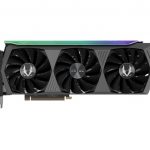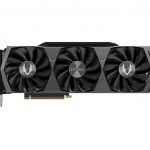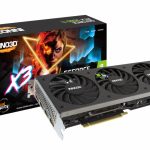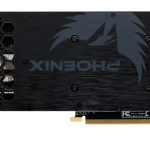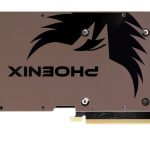Now that Nvidia has announced the RTX 3070 Ti and RTX 3080 Ti GPUs, it's time for AiB partners to share their designs and cards. There will certainly be more third-party graphics cards in the future, but for now, we have details on the first models announced by Asus, MSI, Zotac and others.
Asus TUF Gaming and ROG Strix series
Asus will be launching the RTX 3070 Ti and the RTX 3080 Ti under the TUF Gaming brand. Equipped with 3x Axial tech 0dB fans and a backplate with screen cooling, the TUF Gaming cards feature a 2.7-slot heatsink covered in a black and dark grey shroud with a small Asus Aura Sync RGB LED on the top right corner.
Asus is also bringing the RTX 3070 Ti and the RTX 3080 Ti to the market through the ROG Strix branding, but only the RTX 3080 Ti features the LC (liquid-cooled) version. Like the TUF Gaming cards, the air-cooled ROG Strix cards feature 3x Axial tech fans and an aluminium backplate that lets air pass through the card. The heatsink is slightly taller, at 2.9 inches, and the RGB lighting is more prominent on this card.
As for the ROG Strix RTX 3080 Ti LC, it comes with a 240mm radiator with 2x 120mm RGB fans. From the radiator to the card, there's 600mm of tubing transporting the water. The card itself sports a blower-type cooler with one fan and customisable RGB strips. Like other ROG Strix LC cards, this one also features FanConnect II headers to synchronise with two case fans to adjust their speed based on the card's temperature.
Zotac AMP Holo and Trinity series
The Zotac RTX 3070 Ti and RTX 3080 Ti cards will be available as part of the AMP Holo and Trinity series. The RTX 3070 Ti GPUs will be available as AMP Extreme Holo, AMP Holo, and Trinity cards, while the RTX 3080 Ti GPU comes as AMP Extreme Holo, AMP Holo, Trinity OC, and Trinity cards.
Both the Trinity and AMP Holo cards have similar designs with 3x fans, a grey shroud, a 3-inch slot heatsink, and a backplate with screen cooling. The main differences are in the RGB lighting, which the AMP Holo cards have in the backplate and on the top of the card, and in the GPU clock speeds, where the AMP Holo tends to have the upper hand.
The clock speeds of the AMP Extreme Holo card haven't been listed yet. The RTX 3070 Ti Trinity boosts up to 1770MHz and the AMP Holo model up to 1830MHz. The RTX 3080 Ti come with lower clock speeds, with the Trinity models featuring a 1665MHz (non-OC variant) and 1695MHz (OC variant) boost clocks, and the AMP Holo a 1710MHz boost clock.
Inno3D Frostbite, iChill X3/X4, and X3 series
Inno3D announced a launch line-up of the RTX 3070 Ti and RTX 3080 Ti GPUs with nine models. The X3 series will have an OC and a non-OC variant. Both variants are equipped with a 3x fan cooling solution, a backplate with screen cooling, a dual-slot heatsink, and a shroud with simple aesthetics. The non-OC variants come at stock speeds and the factory-OC ones with a +15MHz boost.
The iChill X3/X4 series will also receive both Nvidia GPUs. These two card models are very similar, with one noticeable difference — the X4 ones, as the name suggests, come with an extra fan. Everything else is basically the same, including the triple fan layout, RGB lighting, backplate, and the rest of the shroud. The RTX 3070 Ti iChill X3/X4 boost up to 1830MHz, and the RTX 3080 Ti cards up to 1830MHz.
The last Inno3D card is the RTX 3080 Ti iChill Frostbite. This model packs a water block with a nickel-plated copper block and RGB lighting, allowing users to easily mount it into a custom water loop. Inno3D claims that using a 240mm or 360mm radiator, the card should operate at 60-65°C.
MSI Ventus 3X, Gaming Trio, and Suprim series
MSI introduced 12 new cards belonging to the Ventus 3X, Suprim, and Gaming Trio series, including OC and non-OC variants. Clock speeds have not been detailed yet, but the Ventus 3X cards should be the lower clocked ones, then the Gaming Trio models, and at last, the Suprim cards.
All models feature a 3x fan cooling solution. Only the Gaming Trio and the Suprim cards feature RGB lighting. All RTX 3070 Ti cards have a backplate with screen cooling, unlike the RTX 3080 cards, from which only the Gaming Trio model allows air to pass through the card.
The Ventus 3X uses Torx 3.0 fans, while the other two series have Torx 4.0. Moreover, the Suprim and Gaming Trio cards also employ the Tri Frozr 2 cooling system, featuring Airflow Control fins and Core Pipes.
Palit GamingPro and GameRock series
Palit has six cards in store for us. Four cards, from which two are RTX 3070 Ti and another two are RTX 3080 Ti, belong to the GameRock series. The remaining two, an RTX 3070 Ti and an RTX 3080 Ti, are from the GamingPro series. The Game Rock cards will be available in OC and non-OC models. Like the non-OC GameRock cards, the GamingPro cards run at stock settings.
The GamingPro cards feature a half black, half grey shroud with customisable RGB lighting. It also features 3x 0dB TurboFans 3.0, a backplate that allows the air to be recirculated into the case and U-pipes to distribute the heat through the heatsink.
Like other GameRock cards, the RTX 3070 Ti and RTX 3080 Ti models will feature the dazzling RGB effect from the crystal-like shroud. The shroud packs 3x 0dB TurboFans 3.0, and the backplate lets air pass through the card more easily. The four cards feature a Dual-Bios switch, allowing users to choose between a silent mode and a performance mode.
Gainward Phoenix series
Gainward launched two aesthetically similar cards, with the only difference being the backplate. The RTX 3080 Ti has a copper-coloured backplate, and the RTX 3070 Ti a darker backplate. Both cards come clocked at stock settings and feature screen cooling and a 2.7-inch slot heatsink cooled by 3x Phoenix 0db fans.
KitGuru says: Are you planning on picking up an RTX 3070 Ti or an RTX 3080 Ti? Out of all these models, which one would you go for?
 KitGuru KitGuru.net – Tech News | Hardware News | Hardware Reviews | IOS | Mobile | Gaming | Graphics Cards
KitGuru KitGuru.net – Tech News | Hardware News | Hardware Reviews | IOS | Mobile | Gaming | Graphics Cards





